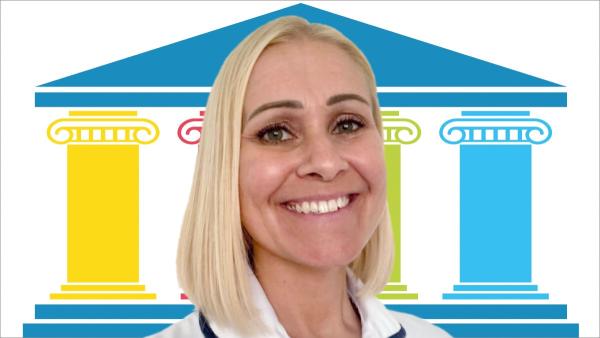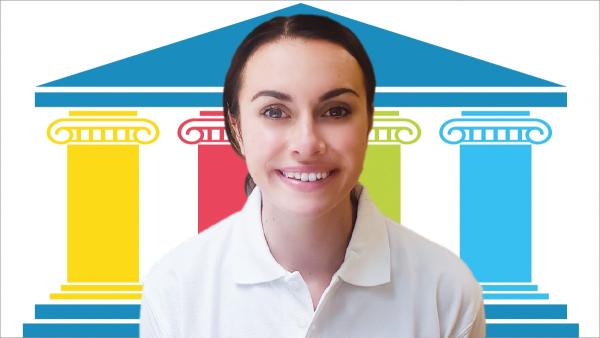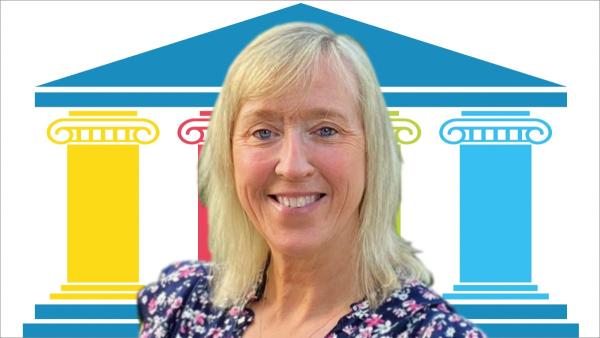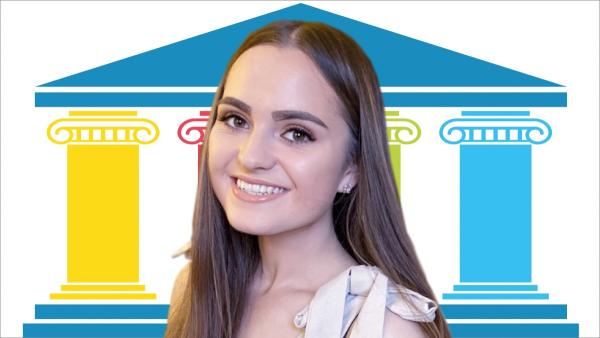Placement providers and former students tell us about the personal and professional benefits gained from learning across the pillars of practice

Embedding the four pillars of practice – clinical, education, leadership and research – firmly within our profession is central to creating a flexible and sustainable workforce. This includes students. As our future physiotherapists, it is important that they develop the knowledge, skills and behaviours that are needed to thrive in modern health care and champion what we do.
During placements, students get to experience what it really feels like to be part of the physiotherapy workforce. The foundations of their professional identity are built and they become more aware of the diversity and reach of where we work and how we practice. By engaging in placements across the four pillars of practice, students’ experiences will better reflect current health care provision and the evolution of professional practice, which in turn can inspire future careers and shape how and where we work.
But what is involved in setting up an education, leadership or research placement? Who is involved and how is supervision structured? Let’s hear from a few members who have done just that to find out more about their experiences and support you in how you too could get involved.
Clinical/Research and Leadership placements
Aneleigh Schofield, Clinical lead physiotherapist (Pelvic Health) and physiotherapy professional lead at Bolton NHS Foundation Trust
What was your aim for the placement you provided?
When Covid-19 was becoming increasingly concerning and placements were being cancelled at an alarming rate, there was a stark realisation that many physio students were at risk of delayed graduation, through no fault of their own. Ultimately, this could have a negative impact on our future workforce supply in the months and years to come.
Although face-to-face outpatient activity was extremely limited and we were still adjusting to new ways of working ourselves, the
pelvic health team decided to take the opportunity to trial a 2:Team clinical/research placement model. Our aim was not only to increase placement capacity but to see how both we, as a service, and our learners in practice might benefit from a new approach, too.
Following a positive first attempt, we were successful in our bid for funding from the HEE Clinical Placements Expansion Project to make this a recurrent, sustainable offer. At the same time, we agreed to also introduce a 4:Team leadership placement as part of the trust’s regular offers.
How does it work?
Clinical/Research placement
The pelvic health placement provides inpatient and outpatient experience and spoke days, includes weekend and extended working patterns, which are reflective of life as a qualified physio. Students are allocated one study per week where they work collaboratively on a research topic of the team’s choice, to support service development.
Leadership placement
The leadership timetable consists of:
- One day of structured teaching on topics pertinent to leadership (QI, leading through conflict, litigation and risk assurance to name but a few).
- One day in clinical practice with a band 5 that has qualified within the last 12 months, to see the transition from student to registrant in practice.
- One day shadowing a leader.
- Two days working collaboratively as a group on a quality improvement project.
Who’s involved and what kind of supervision models do you use?
Clinical/Research placement
A 2:Team approach is implemented and all team members are involved (band 3 senior therapy assistants through to band 7 team leader). We all work part-time but recognise the value that each individual can bring and how this can make for a richer learning opportunity for our students.
Leadership placement
A4:Team approach is coordinated by our AHP practice education facilitator. The programme is supported and facilitated by relevant subject experts and leaders within the trust, including our assistant director of AHPs and chief executive.
How many students have taken part?
Since October 2020, we have supported 35 students in practice using these models – 16 within pelvic health clinical/research placement and 19 as part of the leadership placement offer.
In the past 12 months, eight students who have completed these placements have secured band 5 roles within the trust - the ultimate measure of success!
Why do you think it is important to have experience in this pillar as a student on placement?
Clinical, research and leadership skills are essential from the onset of your physio career. Having a sound understanding of how valuable all team members are and how students can make a really positive contribution to how teams perform is so important.
Has the placement been evaluated, from both a student and host perspective? And, if so, what did the evaluation reveal?
All the students completed end of placement evaluations and these have been entirely positive, notably around the benefits of peer learning and support.
In the past 12 months, eight students who have completed these placements have secured band 5 roles within the trust – the ultimate measure of success!
What would be your top tips for others who might be thinking of offering a similar placement?
Be bold: dare to do things differently but don’t set yourself an impossible task. Remember that changing your expectations doesn’t mean lowering standards.
Be positive: consider how changing placement delivery can benefit you personally, your patients and services, and learners alike. With the right support, students can be a massive help!
Be creative and organised: timetables that offer varied experience and include all team members, including the wider MDT, are well received by students. Be sure to plan ahead, to ensure there is sufficient time allocated for clinical support, regular supervision and the formal assessment process.
Be comfortable with being uncomfortable: it is normal to feel a little apprehensive but change is good. Allow yourself to be pushed outside your comfort zone – you will develop both personally and professionally as a result.
Be kind: it’s been a tough few years but brighter times are ahead. Be kind to yourself and your students and be proud of the incredible learning opportunities you are providing to our future colleagues.
Stephanie Brown, Newly qualified from Manchester Metropolitan University
How did you find the placement?
This placement has to be one of my favourite placements during my course. The whole team helped me develop my confidence in my own capabilities, and I learnt so much throughout!
What did you most enjoy about it?
I liked the fact that I was working with different members of the team on different days, it allowed me to feel more integrated into the team and learn so much from each person. Also, I loved the fact I had another student with me, it was beneficial to have someone else to talk things through with and work together with patients and our project.
And what did you learn – from both the environment and the supervision you received?
I felt that I was able to really develop my transferable skills (communication, team working etc.) with the fact I was working with different people every day. I was able to build my own confidence in patient assessments and treatments and started seeing patients independently with distant supervision – I genuinely felt like part of the team which was great!
Do you have any tips for other students who might be placed in a similar environment?
I would just say to embrace this environment! Ask questions, use your peers, get stuck in and hands on whenever you can. Use this opportunity to learn from all the members of the team as everyone does things differently; you can take away so much.
What type of transferable skills do you think you gained?
This placement improved my communication and team working skills. I also felt like my time management and planning skills also benefitted throughout.
Research and Education placements
Helen Batty Principal Lecturer at the Allied Health Department, Sheffield Hallam University
What was your vision for the placement you provided?
The placement was a practice-based learning experience in education with the physiotherapy team at Sheffield Hallam University. We wanted to provide students with an opportunity to be student lecturers and to be part of the physiotherapy teaching team.
We hoped it would develop the students’ skills in facilitating learning – a key skill for their future career – as well as their knowledge and understanding of the underpinning theories of teaching and learning. We hoped that the experience, knowledge and skills gained would enhance their ability to educate service users and other healthcare professionals, as well enhance their understanding of their own learning needs to enable them to become effective autonomous lifelong learners.
When did you set it up?
In October 2020, due to Covid, we had several students who were unable to be placed. We had been discussing an education placement for some time and this was the perfect opportunity to make it happen. We had only three weeks to plan the placement. The team were keen to organise it and worked together to plan how it would work and prepare the students for a placement which was very different to anything they had completed before. The main educators involved in the planning were Helen Batty, Gerry Scott, Kathryn Cassidy and Karen Stevens.
Who was involved and what kind of supervision models did you use?
It was a whole team approach as students spent time with different members of the teaching team. Students had one main named educator for the duration of the placement. Models of supervision used were 2:1 or 5:1.
Students had both group and individual supervision sessions every week where they were encouraged to reflect and relate their learning to their future clinical practice. They also had weekly formal peer support sessions.
The placement was a blended approach which consisted of:
- Two days a week teaching or preparing for teaching,
- One day a week independent learning on the underpinning theories of teaching and learning
- One day a week working on a project to develop leadership and problem-solving skills.
Students were taught on level 4 modules which were running at the time – MSK, neurology and an inter-professional module. They developed and delivered both classroom-based teaching sessions as well as online teaching. Their knowledge and skills developed over the weeks so that in final week of the placement they were all delivering teaching sessions independently.
For example, the students working on the inter-professional module independently developed and delivered an online one hour session to 60 students of different professions by the end of the placement. They did a superb job, gained excellent feedback from the level 4 students involved and were very proud of themselves for what they had achieved which they would never have thought possible at the beginning of the placement.
How many students took part?
Seven BSc level 6 students and two MSc year one students on their first placement.
One student was unable to come back to the UK due to Covid so was able to complete the placement online from Hong Kong by teaching on the inter-professional module which was running fully online at the time. Without completing this placement, she would not have been able to qualify on time.
Why do you think it is important for students to gain experience in this pillar whilst on placement?
Facilitating learning is a key skill for physiotherapists. As physiotherapists we are involved in education daily, either informally or formally, so it is essential to equip our future graduates with excellent knowledge, skills and understanding in this pillar.
Involving students in facilitating learning within practice-based learning will ensure that graduates can educate and empower others throughout their careers.
This includes service users and their families, students, engaging in in-service training and supporting colleagues. It will help to ensure a supply of future educators in HEI’s and training facilities to educate the next generation of physiotherapists and healthcare workers. Ensuring our graduates have excellent knowledge, skills and understanding in this pillar will enhance patient care.
Was the placement evaluated?
A qualitative evaluation was completed following the placement. Two focus groups were undertaken – one with students and one with educators to gain the thoughts and experiences of those involved.
Key themes identified were:
- success of the placement overall
- the importance and success of the blended learning approach
- key transferable skills were enhanced such as teaching, communication, organisation and teamwork
- the application of the key skills enhanced, to clinical practice
- the benefits of peer support during the placement
Students were followed up post-graduation, when they were working as physios. They reflected that they had many transferable skills and felt they had not missed out, recognising instead the relevance of the skills they gained.
What would be your top tips for others who might be thinking of offering a similar placement?
- Universities must prepare students for placements across the four pillars. This will ensure students’ expectations are met and the value of placements across all four pillars are recognised.
- Ensure the allocation process is fully inclusive. Do not ‘cherry pick’ students.
- Take time to prepare the placement to ensure a quality learning experience for all. Seek help and advice from your university.
- Never have just one student! A minimum of 2:1 or ideally a 4:1 model works best. Peer support is paramount.
- Have a whole team approach.
- Prepare students for the placement. Ideally meet with them before the placement to discuss what they should expect, how the placement is relevant to their clinical practice and future career, answer their questions and detail how they should prepare.
- Empower students to contribute their ideas to shape their learning experience.
- Do not underestimate what students can achieve. Build up their exposure to teaching and learning opportunities over the course of the placement. They will surprise themselves at what they can do!
- Use group supervision, peer support and individual supervision methods.
- Encourage students to reflect on their learning in a variety of ways and relate what they learn to clinical practice.
- The HEE Guide to Practice Based Learning In Education will help both educators and students prepare for a placement in an education setting.
Imogen Beresford, Former student on the placement, recently qualified from Sheffield Hallam
How did you find the placement?
The placement was completely new to me, it was something I had never heard of before. I was apprehensive at the beginning of the placement, but found it a very rewarding experience and now value my learning from this.
What did you most enjoy about it?
I enjoyed working as part of a group to develop a learning platform for students. It was interesting to hear others ideas and come up with creative ideas to put these into a learning platform.
And what did you learn – from the environment and the supervision you received?
I learnt teaching skills, team work skills, how to be open to new opportunities, how to use various IT skills and platforms, and reflection skills. I think this placement also gave me a lot of confidence to present and lead training in my currently role.
Do you have any tips for other students who might be placed in a similar environment?
Be positive about the placement from the beginning – although it might seem different and not as clinical as other placements there are so many valuable skills to learn from this to utilise in your qualified career.
What type of transferable skills do you think you gained from this placement?
Team working, teaching, reflections, motivational skills, delivering information in an effective format, computer skills, working as a team remotely and good communication.
Number of subscribers: 2




